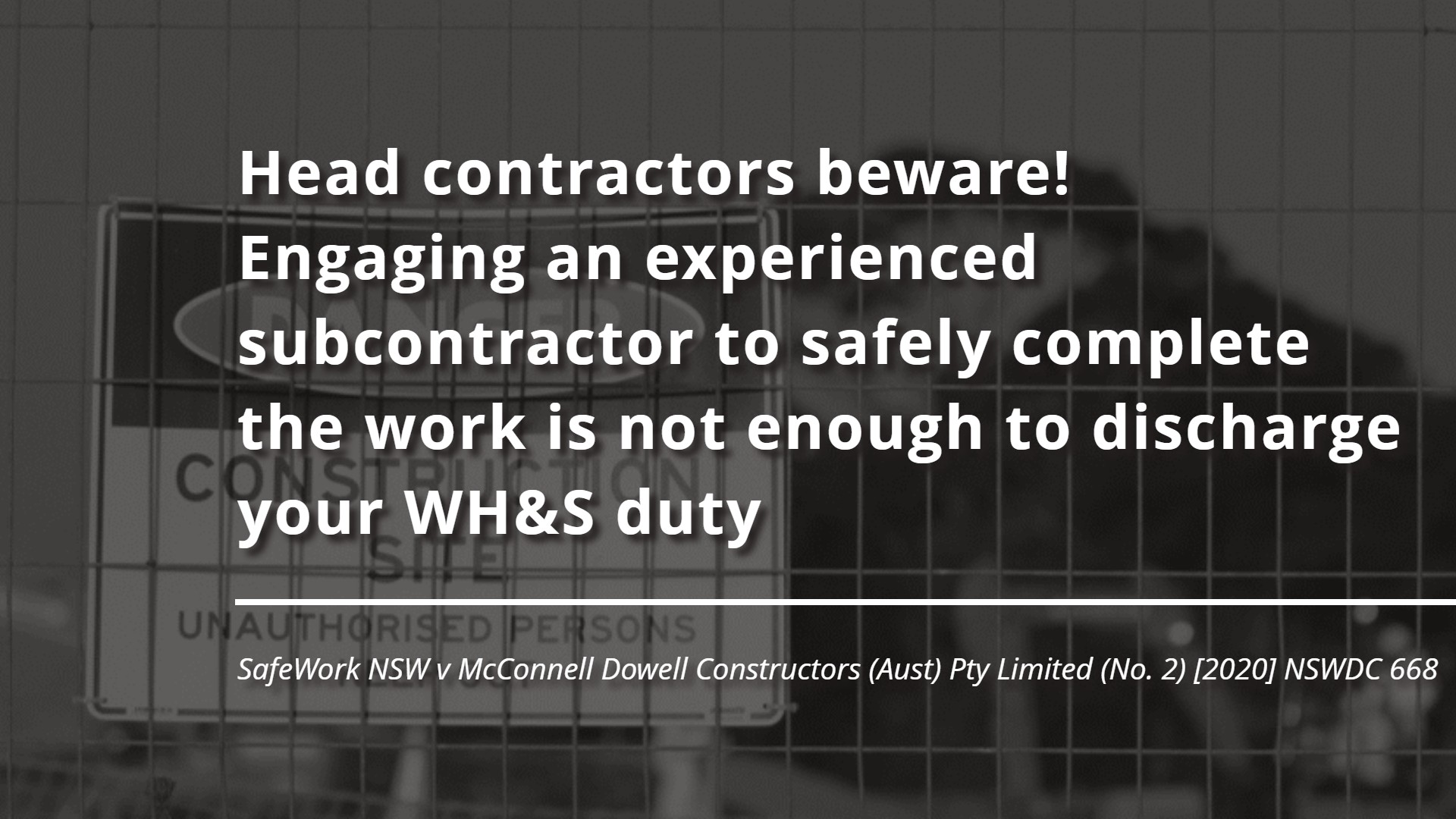
In a recent NSW District Court decision, McConnell Dowell Constructors (Aust) Pty Limited was found guilty of breaching its health and safety duty and exposing workers to a risk of death or serious injury. McConnell Dowell Constructors faces a maximum penalty of $1,500,000, with the sentencing hearing to occur on a date to be decided. A complete copy of the decision can be accessed by clicking here.
The charge relates to the tragic March 2017 incident on the $60m Barangaroo ferry terminal project in Darling Harbour, Sydney, where a worker employed by Brady Marine & Civil Pty Ltd was crushed to death when an unsecured heavy metal beam toppled over.
McConnell Dowell Constructors was the head contractor on the project that engaged Brady Marine & Civil, an experienced piling and marine subcontractor, to carry out works on the project.
Under the relevant contract, Brady Marine & Civil was contractually obliged to control and maintain the relevant works, implement and “fully comply” with appropriate safety systems and “ensure the health and safety of persons”.
The prosecutor alleged that whilst Brady Marine & Civil was subcontracted to safety complete the work, McConnell Dowell Constructors still had a duty to ensure, so far as it reasonably practicable, the health and safety of workers employed by Brady Marine & Civil.
In support of its allegation McConnell Dowell Constructors breach that duty, the prosecutor particularised a number of measures that McConnell Dowell Constructors, as head contractor, should have taken to discharge its duty and eliminate risk to health and safety, or minimise the risk if elimination was not reasonably practicable.
In response, McConnell Dowell Constructors acknowledged that it had a health and safety duty to workers but argued that:
- it satisfactorily discharged that duty by engaging Brady Marine & Civil, as an experienced subcontractor, to safely complete the relevant works;
- it was entitled to rely on Brady Marine & Civil for the proper implementation and maintenance of safety systems regarding the works; and
- it was not reasonably practicable for McConnell Dowell Constructors to be involved in the application of those safety systems to every aspect of the work being performed by Brady Marine & Civil.
In finding that McConnell Dowell Constructors breached its health and safety duty and that such breach exposed workers to a risk of death or serious injury, the Court held:
- McConnell Dowell Constructors owed a health and safety duty to the workers employed by Brady Marine & Civil;
- McConnell Dowell Constructors was not entitled to simply rely on Brady Marine & Civil for the proper maintenance and implementation of a safety system to discharge its work health and safety duty;
- McConnell Dowell Constructors should have taken measures to eliminate or minimise risk to Brady Marine & Civil’s workers, including:
- undertaking a risk assessment regarding the unsecured heavy metal beams;
- ensuring that the relevant works were being safety completed and adequately supervised; and
- exercising its power to stop the work because it was unsafe and directing Brady Marine & Civil to lay the heavy beams down or restrain/secure the beams.
- It was reasonably practicable for McConnell Dowell Constructors to take one or more of those measures; and
- McConnell Dowell Constructors’ failure to take one or more of those measures exposed workers to the risk of death or serious injury.
Takeaway
This decision serves as a timely reminder that all principals, contractors and subcontractors must take reasonably practicable measures to ensure the health and safety of workers.
Principal contractors cannot simply rely on the engagement of skilled and experienced subcontractors to assume that the works are being safely completed and must be actively involved with ensuring safety.
This publication does not deal with every important topic or change in law and is not intended to be relied upon as a substitute for legal or other advice that may be relevant to the reader’s specific circumstances. If you have found this publication of interest and would like to know more or wish to obtain legal advice relevant to your circumstances please contact one of the named individuals listed.


